

8 Strategies To Help Students Ask Great Questions. 8 Strategies To Help Students Ask Great Questions by Terry Heick Questions can be extraordinary learning tools.
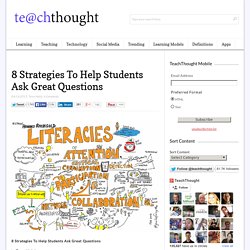
A good question can open minds, shift paradigms, and force the uncomfortable but transformational cognitive dissonance that can help create thinkers. In education, we tend to value a student’s ability to answer our questions. But what might be more important is their ability to ask their own great questions–and more critically, their willingness to do so. The latter is a topic for another day, but the former is why we’re here. 1. The TeachThought Learning Taxonomy is a template for critical thinking that frames cognition across six categories. It imagines any learning product, goal, or objective as a “thing,” then suggests different ways to think about said “thing”–mitosis, a math formula, an historical figure, a poem, a poet, a computer coding language, a political concept, a literary device, etc. 1. 2. 3. 4. 5. 6.
Prompt: Parts–Give examples and non-examples The upside? The Challenges and Realities of Inquiry-Based Learning. Inquiry Learning Teaching Strategies Getty By Thom Markham Teachers in a rural southeast Michigan high school were recently discussing the odd behavior of the senior class.
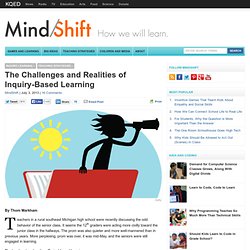
It seems the 12th graders were acting more civilly toward the junior class in the hallways. The prom was also quieter and more well-mannered than in previous years. The teachers’ explanation: Project-based learning. Here’s the back story. Stories like this are about to become more important to educators. This is a steep challenge because it forces education to cross a philosophic divide.
Standardizing Valuable Skills To put a new system in place, a first key step is to disseminate and train every teacher on a clear set of performance standards to assess skills required for effective inquiry, such as communication, collaboration, critical thinking, and creativity. The challenge: Right now, a standards-based environment forces teachers to straddle the inquiry process.
Assessing Collaborative Learning Figuring Out Knowledge. Creating Classrooms We Need: 8 Ways Into Inquiry Learning. If kids can access information from sources other than school, and if school is no longer the only place where information lives, what, then happens to the role of this institution?
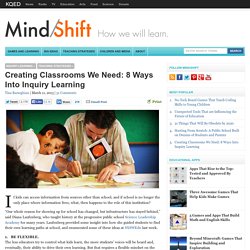
“Our whole reason for showing up for school has changed, but infrastructure has stayed behind,” said Diana Laufenberg, who taught history at the progressive public school Science Leadership Academy for many years. Laufenberg provided some insight into how she guided students to find their own learning paths at school, and enumerated some of these ideas at SXSWEdu last week. 1. BE FLEXIBLE. The less educators try to control what kids learn, the more students’ voices will be heard and, eventually, their ability to drive their own learning.
Laufenberg recalled a group of tenacious students who continued to ask permission to focus their video project on the subject of drugs, despite her repeated objections. 2. Laufenberg’s answer: Get them curious enough in the subject to do research on their own. Why Inquiry Learning is Worth the Trouble. Visualization of SLA principal Chris Lehmann's 2011 talk: guiding kids' to thinking about how they think.
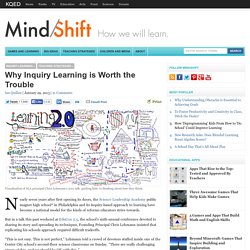
Nearly seven years after first opening its doors, the Science Leadership Academy public magnet high school* in Philadelphia and its inquiry-based approach to learning have become a national model for the kinds of reforms educators strive towards. But in a talk this past weekend at EduCon 2.5, the school’s sixth-annual conference devoted to sharing its story and spreading its techniques, Founding Principal Chris Lehmann insisted that replicating his schools approach required difficult tradeoffs. “This is not easy. This is not perfect,” Lehmann told a crowd of devotees stuffed inside one of the Center City school’s second-floor science classrooms on Sunday. “There are really challenging pieces of this, and we should be OK with this.” “Inquiry means living in the soup. “To me it comes down to process,” Lehmann said. “Oh God, yeah,” Lehmann said in response to the latter teacher.
Related. 5 Tools to Help Students Learn How to Learn. Helping students learn how to learn: That’s what most educators strive for, and that’s the goal of inquiry learning.
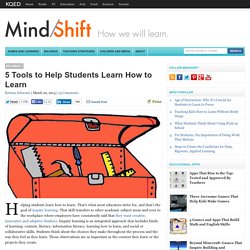
That skill transfers to other academic subject areas and even to the workplace where employers have consistently said that they want creative, innovative and adaptive thinkers. Inquiry learning is an integrated approach that includes kinds of learning: content, literacy, information literacy, learning how to learn, and social or collaborative skills. Students think about the choices they make throughout the process and the way they feel as they learn. Those observations are as important as the content they learn or the projects they create. “We want students thinking about their thinking,” said Leslie Maniotes a teacher effectiveness coach in the Denver Public Schools and one of the authors of Guided Inquiry: Learning in the 21st Century.
“When they are able to see where they came from and where they got to it is very powerful for them.” 20 Questions To Guide Inquiry-Based Learning. 20 Questions To Guide Inquiry-Based Learning Recently we took at look at the phases of inquiry-based learning through a framework, and even apps that were conducive to inquiry-based learning on the iPad.
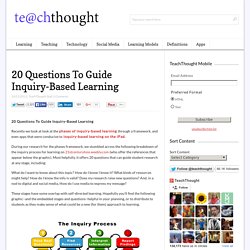
During our research for the phases framework, we stumbled across the following breakdown of the inquiry process for learning on 21stcenturyhsie.weebly.com (who offer the references that appear below the graphic). Most helpfully, it offers 20 questions that can guide student research at any stage, including: What do I want to know about this topic? How do I know I know it?